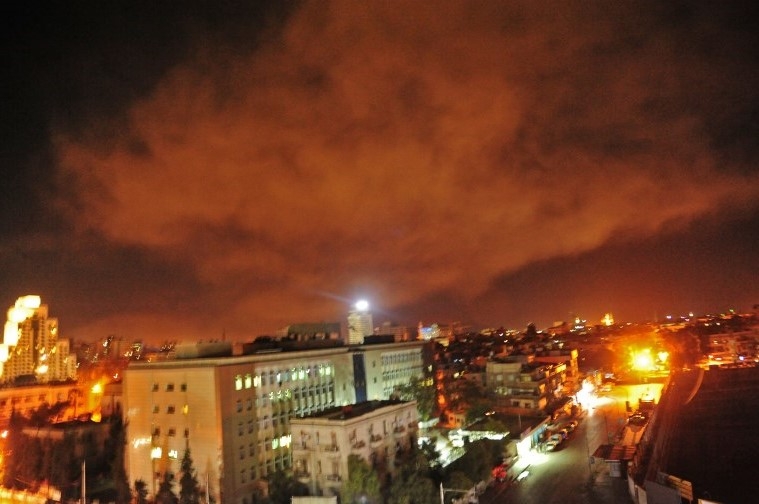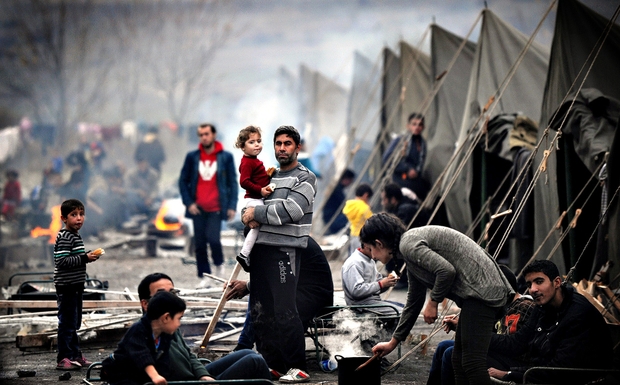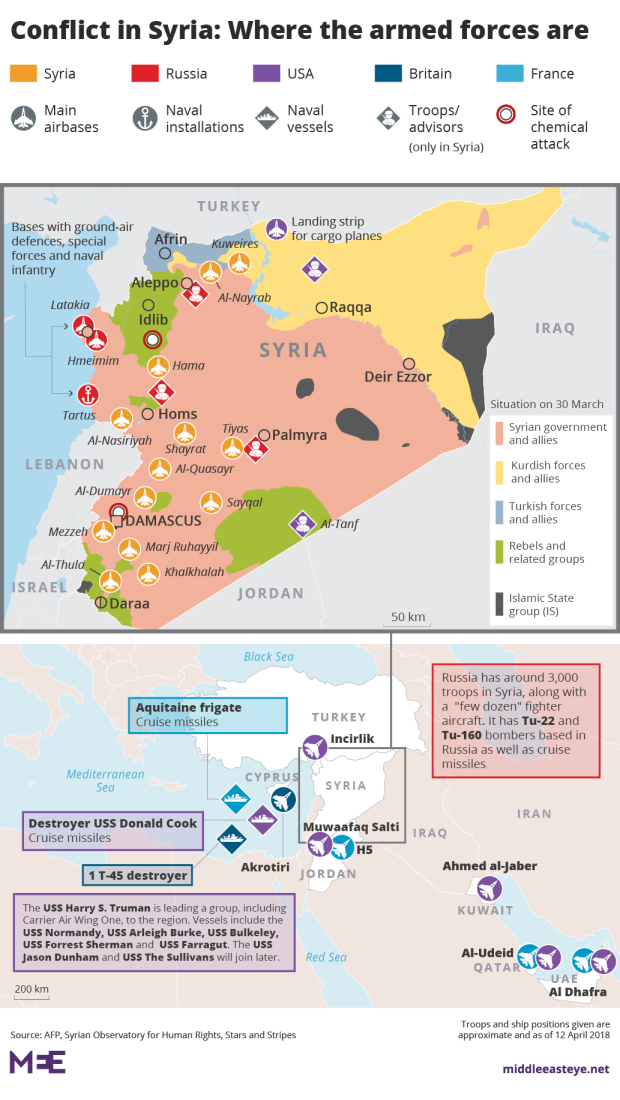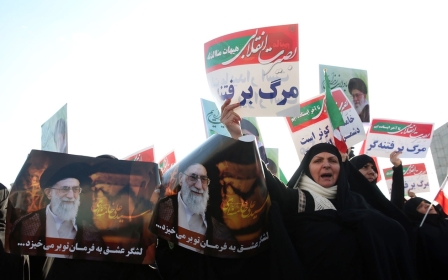Bombing Syria is a Saudi-sponsored adventure that will achieve nothing

In the Arab world, even those who support Western military strikes on Syria remain sceptical about their timing, purpose and outcomes. Whether the objective was punishing Assad, protecting civilians, or mere revenge, it is highly unlikely that the strikes are destined to yield positive outcomes.
Notwithstanding how hastily the decision was taken in Washington, London and Paris to bomb Bashar al-Assad's forces, the legality of the strikes remains controversial. Without a UN consensus and a full report from chemical weapons inspectors, the Friday strikes will always remain suspicious and will no doubt fail to achieve any of their stated objectives.
A controversial endeavour
Under international law, military intervention for humanitarian reasons remains a controversial endeavour. But the three Western capitals went ahead without international or domestic debate about their legality, let alone a resolution authorising them. Neither the US, Britain nor France sought serious consultations with their own parliaments or with the wider international community.
From Nasser of Egypt, Saddam of Iraq, and Gaddafi of Libya, erratic Western bombs prolonged the lifespan and boosted these leaders’ domestic legitimacy rather than eliminated them
In the Arab world, Western military interventions from 1956 until now have a wretched history, achieving exactly the opposite of their stated objectives. Bombing Egypt in the 1950s, Libya in the 1980s, Iraq in the 1990s, and now Syria had always strengthened rather than weakened the agents they were meant to destroy.
From Nasser of Egypt, Gaddafi of Libya, to Saddam of Iraq, erratic Western bombs have prolonged the lifespan and boosted these leaders’ domestic legitimacy rather than eliminated them.
When the objective was regime change such as in Iraq in 2003 and Libya in 2011, interventions resulted in upheavals unmatched in the history of the Arab world except for the displacement of Palestinians since 1948.
It is a rule of thumb that Western military interventions have strengthened non-state actors such as the militias that operate on the ground in countries where central authorities have disintegrated or been fatally weakened.
Why now?
Scepticism about the recent episode of military intervention in Syria has to be understood in the context of why Washington, London and Paris are only now ready to intervene in response to the Ghouta conflict where chemical weapons have allegedly been used by the regime and resulted in the death of hundreds of civilians over several years.
During the visit, President Trump made it clear that he is ready to leave US soldiers in Syria, a force estimated to be around 2,000 only - and only if someone pays for them.
The US president has truly converted the so-called superpower's military might into a hired mercenary force ready to be deployed upon receiving cash. The Saudi crown prince won’t hesitate to throw money at a thorny intervention by his own regime in Syria.
The Arab world’s main problem is dictators who continue to be supported by foreign powers, and foreign powers bombing them when they cease to be useful
Saudi intervention has yielded zero gain. Seven years into the Syrian conflict, Saudi Arabia failed to cut Iran off from the eastern shores of the Mediterranean Sea, topple Bashar Assad and install a puppet Syrian regime.
With his Russian scandals unfolding in the US, President Trump needed to show that he is tough on Russia, hence his military strikes prove to his domestic audiences that he is ready and mighty when it comes to countering Russia's increasing influence in Syria. If the chemical attacks did actually happen, they were authorised by a client of Russia.
Trump wants to punish Russia for the misdemeanour of its protege, namely Assad of Syria, thus demonstrating to Americans that he is no ally of Putin.
A great opportunity
And what about Britain, the junior military interventionist? To understand the recent strikes, we must locate them in the current political situation in London where a Conservative government is desperate to unravel the consequences of the tension with Russia over the Salisbury attack.
It seems that the expulsion of Russian diplomats is not enough to detract from the serious Russian actions on British soil. The strange thing is that the UK looked the other way at a number of Russian-linked murders over more than a decade and only now has taken action.
This points to a government struggling with the intricacies of a major transformation following Brexit, and the nightmare of a shrinking economy that haunts British Prime Minister Theresa May.
She jumped at the opportunity to flex weakened and sagging muscles, and to bolster her fragile domestic political position. Bombing Syria was a great opportunity to show how tough London is on the Russians, who can cause havoc on the streets of British cities when they unleash poisonous substances against their critics and dissidents. Britain bombed Syria to assert its sovereignty against an intruding and aggressive Russia.As for France, Emmanuel Macron is struggling against domestic forces which have proved to be stubbornly resistant to his new economic policies. From the recent strikes of the railway workers to those of the airlines, transportation in France has been brought to a halt by a series of civil actions against Macron's flagship policies to curb the power of trade unions.
In a country where no restaurant will serve you lunch after 2pm, working hours are the shortest in Europe, and concern with les vacancies overrides any other important endeavour, Macron needs to rejuvenate a nation plagued by several crippling forces. From racism, Islamophobia, right-wing ultra-nationalism and unemployment, Macron needs to prove that France is still great, especially in the Levant, its historically cherished region. Bombing Syria is just a way of saying that France still matters.
Arab world's main problem
No matter how precisely this bombing was executed, erratic US, British and French strikes are really not about the Syrian people and their seven-year-old plight. Dispossession, displacement and death are not going to be ended after a few bombs are dropped here and there.
The bombs followed immediately after the Saudi crown prince's visits to the three capitals, where economic promises were made, and contracts to purchase more weapons were signed. Bombing Syria is a Saudi-sponsored adventure that won't resolve the conflict in Syria nor return refugees to their homes.
The Arab world has learned to take Western pledges to save the people with a pinch of salt. When this West has been a contributing force to prolonging the lives of dictators, selling them deadly weapons, and draining their resources in return for useless Western military arsenals that only protect such dictators, it is very difficult to take seriously Western pledges of this kind.
The Arab world’s main problem is dictators who continue to be supported by foreign powers, and foreign powers bombing them when they cease to be useful. The problematic Western interventions, past and present, will remain controversial and dangerous.
When they are financed by Saudi petrodollars, they are even more problematic, serving the interest of a lethal repressive regime rather than the suffering people of Syria.
- Professor Madawi al-Rasheed is a visiting professor at the Middle East Centre at the London School of Economics. She has written extensively about the Arabian Peninsula, Arab migration, globalisation, religious transnationalism and gender. On Twitter: @MadawiDr
The views expressed in this article belong to the author and do not necessarily reflect the editorial policy of Middle East Eye.
Photo: A photo released early on April 14, 2018 on the website of the official Syrian Arab News Agency (SANA) shows an explosion on the outskirts of Damascus after Western strikes reportedly hit Syrian military bases and chemical research centres in and around the capital (SANA/AFP)
This article is available in French on Middle East Eye French edition.
Middle East Eye propose une couverture et une analyse indépendantes et incomparables du Moyen-Orient, de l’Afrique du Nord et d’autres régions du monde. Pour en savoir plus sur la reprise de ce contenu et les frais qui s’appliquent, veuillez remplir ce formulaire [en anglais]. Pour en savoir plus sur MEE, cliquez ici [en anglais].







